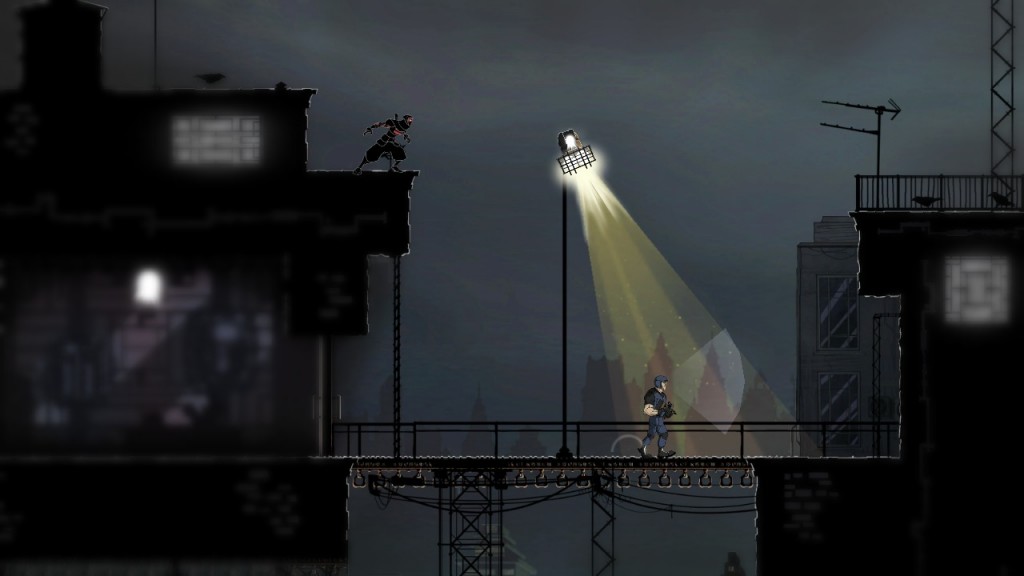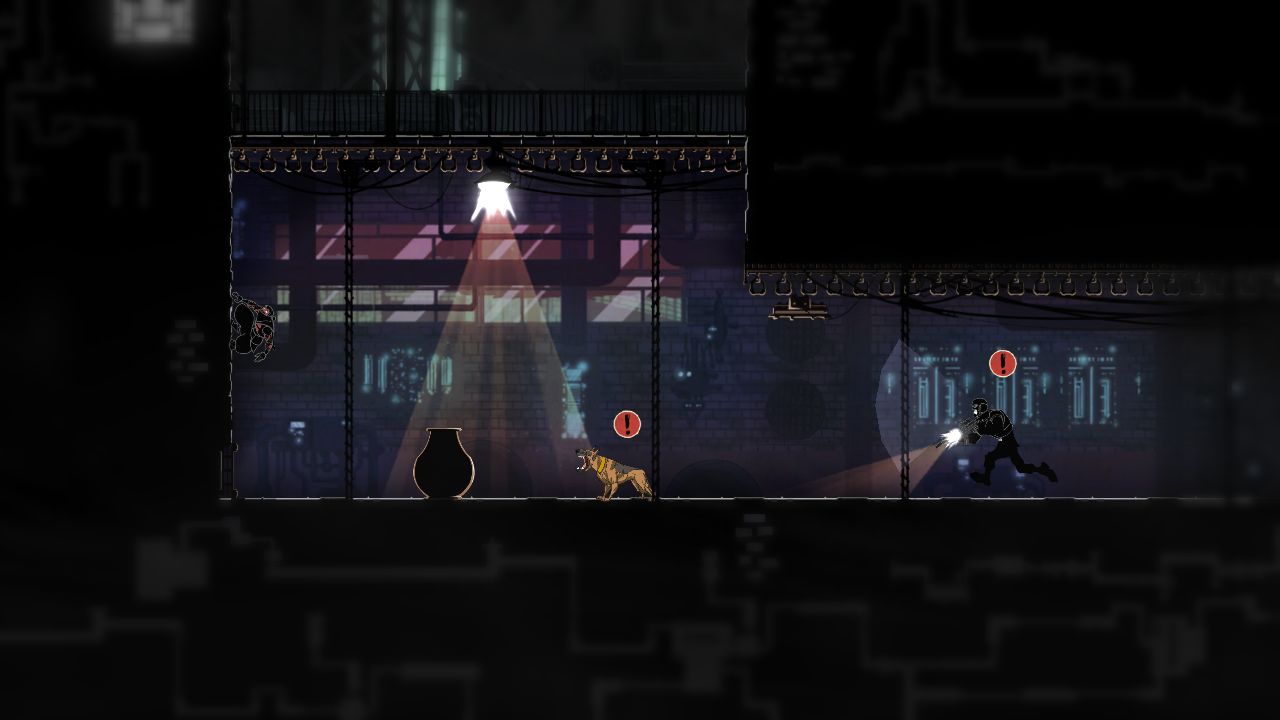So many of the elements prone to cause frustration in a stealth game are not present in Mark Of The Ninja, the clarity and consistency of feedback is some of the best I’ve seen in the genre. The straightforward manner in which visibility, audibility and even memory (Both of the player character and non-player characters) is visually conveyed puts the stealth mechanics of games like Splinter Cell to shame. No meters or radar systems, all the information that’s relevant and useful is displayed exactly where it does the most good, in the world. The basis of visibility may be binary but that ensures your current visibility is always instant readable, as is the the safety of different parts of the level.

With a fluid move-set, building on Klei Entertainment’s previous Shank games and a variety of multi-function tools Mark Of The Ninja offers opportunities for experimental play both intentionally and improvisational. The former is supported by allowing you to observe the spaces you are about to enter without having to put yourself at risk. This can take the form of either peering through grates, looking down from hiding places on the roof or, during later stages using an augmented vision mode that brings to mind both Arkham Asylum‘s Detective Mode and the Crosslink Mode of Gunpoint. Able to parse the play space before you enter and with the initiation of encounters in your hands Mark Of The Ninja allows players to be pro-active, to plan out their route through a space before choosing to commit to action. Players can formulate a plan and then feel suitably smart and skilful when they successfully execute it.
Of course, that isn’t always how things work out, sometimes that guard turns around at precisely the wrong moment, or that jump doesn’t take you as far as you’d like and suddenly you’re standing in the light with a dog on one side and an armed guard on the other. At moments like this the move-set available and the tools you are carrying go from being means of executing your cunning plan to desperate escape measure, at least they would if the “Restart Checkpoint” option wasn’t often the most expedient way to resolve such problems.
The primary method by which different approaches are encouraged and rewarded throughout Mark of The Ninja is via points and leaderboards. Remain concealed while a guard passes by your location? “+200 Undetected”. Conceal the body of one of your unfortunate victims? “+250 Body Hidden”. Each level also has three bonus objectives, which can range from reaching a specific location undetected, to avoiding taking any damaged while traversing a trap filled room. Successfully achieving these bonus objectives grants seals that can be used to upgrade your abilities, as does finding the three scrolls hidden in each level. Being spotted by an enemy does not immediately cost points though it can make achieving some of the bonus objectives harder, however allowing an alarm to be triggered does immediately cost; a scarlet “-800” appearing in the top left of the screen. As well as needing to deal with the consequences of the alarm itself players will have to deal with the instant loss of 800 points from their total. When most individual actions grant between 200 and 400 points this can be a difficult loss to compensate for. That’s why whenever I see that “-800” I instinctively stab at the Start button and Restart Checkpoint. Despite the tools available being ones that I feel would allow me to resolve the problem presented by alerted guards and the alarm, the presence of a clear decrease in my point total is one I have trouble accepting. It feels like a much more definitive failure that it truly is, or needs to be.

The use of points to grade performance and to encourage certain play styles is not something I have a problem with in itself. Unlike Deus Ex: Human Revolution where the clear benefit offered by stealth stood in contrasted to the supposed freedom of approach Mark Of The Ninja is upfront about its nature as a stealth game. There are parts where the grading is handled well, specifically the 5000 point bonus for completing a level without killing anybody is something that has certainly motivated me to try. The difference between this encouragement not to kill and the discouragement from setting off alarms stems from the manner in which they are presented. The former is only referenced at the end of each level when the total score is being calculated. There is no “-5000” that flashes on screen when you perform your first assassination in a level. I can’t help but imagine that if there had been many more people would attempt a ghost run and quickly become frustrated.
Confusingly what feels like a more fitting solution is already present. In the post-level scoring screen there is a 3000 point bonus for not sounding any alarms. So there is both a direct penalty for sounding an alarm and a bonus that is only attainable if you managed to avoiding doing so. Does there really need to be the former? The encouragement to avoiding sounding alarms would still be present with only the post-level bonus. Recovery from failure can present some of the most memorable experiences in a game and moving the decision of whether to attempt to complete a section without setting off an alarm from the point at which it occurs to a point after recovery may have been achieved would grant the opportunity for these memorable moments to occur. Mark Of The Ninja has the mechanics to allow for memorable improvisational play, but the manner in which it grades performance seems liable to discourage it.
One reply on “Ninja Skills.”
I really don’t like the points system, now. After going back and playing through the game on NG+, I found the points compelled me both to restart really often—every time a guard was alarmed, in fact, as the -800 points kicked in—and to play in a stupid way: stopping and hiding in places I didn’t need to for the undetected bonus, then later dragging six bodies down five floors to hide them in a vent on the bottom floor for the 1500 points that would give. The points have made the game something of a grind for me. I simultaneously dislike the game for having them, and dislike myself for feeling compelled to try and maximise my points.
The -800 “alarm sounded” bonus is particularly obnoxious. When I was trying to ghost my way through levels, it made sense to restart as soon as a guard became alarmed. But feeling compelled to do so when not ghosting change the flow. I was not fluidly adapting to a changing situation, but instead trying for a “perfect” run of a section. It became more Super Meat Boy than Thief.
Adding to the value of restarting over adapting is that alarms are often hard to recover from. Even if you try to dash your way to escape, the guards have exceptional aim and will shoot you very quickly (and on NG+, generally kill you in one shot). You can use items to escape, but the number of items is too low, so their value is too high to use reactively rather than tactically, especially when the restart button is there, and free.